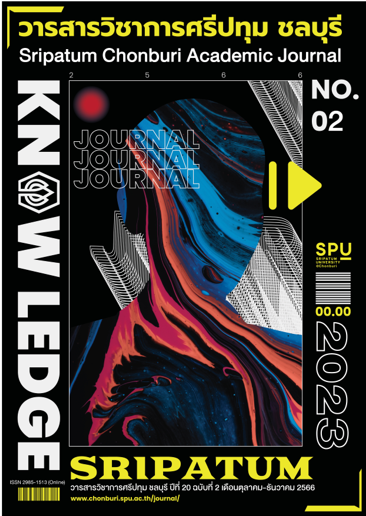THE CAUSAL RELATIONSHIP BETWEEN INTERNAL BUSINESS ENVIRONMENTMENT, CORPORATE ENTREPRENEURSHIP ON GROWTH OF SMALL AND MEDIUM ENTERPRISES IN BANGKOK
Keywords:
Internal Business Environment, Corporate Entrepreneurship, Business GrowthAbstract
The objective of this research was to study the causal relationship between the internal business environment, corporate entrepreneurship and growth of small and medium enterprises in Bangkok. The data obtained from the samples based on the criteria of Krejcie & Morgan and analyzed by the structural equation model with computer program were collected from 384 small and medium enterprises in Bangkok.
It was found that the internal business environment had a positive effect on corporate entrepreneurship and growth of small and medium enterprises, and the corporate entrepreneurship had a positive effect on growth of small and medium enterprises. This research contributes to the entrepreneurs of small and medium enterprises in using the research results as basic information for decision making in considering the internal environment of the organization, which results in sustainable business growth.
References
ธวัช ภูษิตโภยไคย. (2560). การบัญชีกับการจัดการสำหรับ SMEs. วารสารวิชาชีพบัญชี, 13(40), หน้า 72-81.
วรรณลภย์ สุริยะโยธิน และทวีศักดิ์ กฤษเจริญ. (2559). อิทธิพลของโครงสร้างองค์กรต่อผลการปฏิบัติงานตามคุณลักษณะขององค์กรเชิงนวัตกรรม.
วารสารสังคมศาสตร์มหาวิทยาลัยศรีนครินทรวิโรฒ, 19(1), หน้า 200-217.
สำนักงานส่งเสริมวิสาหกิจขนาดกลางและขนาดย่อม. (2560). แผนการส่งเสริมวิสาหกิจขนาดกลางและขนาดย่อม ฉบับที่ 4 (พ.ศ.2560-2564) (ออนไลน์).
เข้าถึงได้จาก: https://www.sme.go.th/upload/mod_download/%E0%B9%81%E0%B8%9C%E0%B8%99%E0%B9%81%E0%B8%A1%E0%B9%88%E0%B8%9A%E0%B8%97%E0%B8%AF%20%E0%B8%89%E0%B8%9A%E0%B8%B1%E0%B8%9A%E0%B8%97%E0%B8%B5%E0%B9%88%204.pdf [2565, 16 พฤศจิกายน].
Allen, R.S., & Kilmann, R.H. (2001). The role of the reward system for a total quality management based strategy. Journal of
Organizational Change Management, 14(2), pp. 110-131.
Antoncic, B., & Hisrich, R.D. (2003). Corporate entrepreneurship contingencies and organizational wealth creation. Journal of
Management Development, 23, pp. 518-550.
Covin, J.G., & Slevin, D.P. (1986). The development and testing of an organizational-level Entrepreneurship scale. Frontiers of
Entrepreneurship Research, 3, pp. 628-639.
Hitt, M.A., Ireland, R.D., Camp, S.M., & Sexton, D.L. (2001). Guest editors’ introduction to the special issue strategic entrepreneurship:
entrepreneurial strategies for wealth creation. Strategic Management Journal, 22, pp. 479-491.
Hornsby, J. S., Kuratko, D. F., & Zahra, S. A. (2002). Middle managers’ perception of the internal environment for corporate
entrepreneurship: assessing a measurement scale. Journal of Business Venturing, 17(3), pp. 253-273.
Karacaoglu, K., Bayrakdaroglu, A. & San, F. (2013). The impact of corporate entrepreneurship on firm’s financial performance :
evidence from Istanbul stock exchange firms. International Business Research, 6(1), pp. 163-175.
Krejcie, R. V., & Morgan, D. W. (1970). Determinging sample size for research activities. Educational and Psychological Measurement,
(3), pp. 607-610.
Lo, M.C., Wang, Y.C., Wah, C.R.J., & Ramayah, T. (2016). The critical success factors for organizational performance of SMEs in Malaysia:
a partial least squares approach. Review of Business Management, 18(61), pp. 370-391.
Makaya, S.O. (2012). Corporate entrepreneurship and organizational performance: theoretical perspective, approaches and outcomes.
International Journal of Art and Commerce. 1(September), pp. 133-143.
Margarietha, J. S. (2007). Entrepreneurial intensity : The influence of antecedents to corporate entrepreneurship in firms operating
in South Africa. Available: https://scholar.sun.ac.za/server/api/core/bitstreams/f9d3c351-088a-4170-9c6e-ccd4c2bec3b8/content
, July 26].
Penrose, E. (1959). The Theory of the Growth of the Firm. New York, Wiley.
Downloads
Published
Issue
Section
License
Copyright (c) 2023 Sripatum Chonburi Academic Journal

This work is licensed under a Creative Commons Attribution-NonCommercial-NoDerivatives 4.0 International License.
บทความทุกบทความเป็นลิขสิทธิ์ของวารสารวิชาการศรีปทุม ชลบุรี



